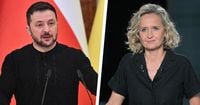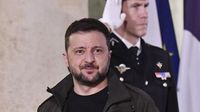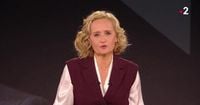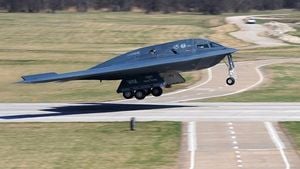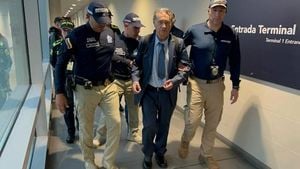On the evening of March 26, 2025, France 2 made a significant programming change to accommodate a special interview with Ukrainian President Volodymyr Zelensky. The broadcast began at 21:00, where Zelensky spoke directly to Europe, addressing pressing issues ahead of the upcoming Summit on Peace and Security for Ukraine, organized by French President Emmanuel Macron.
This interview was not just a solo appearance; it featured a panel of esteemed journalists, including Caroline Roux from France 2, Jeremy Bowen from the BBC, Jessy Wellmer from ARD, and Joakim Klementi from Estonian Public Broadcasting. Each journalist posed questions to Zelensky, allowing for a comprehensive discussion on Ukraine's current situation amid the ongoing conflict with Russia.
France 2's decision to air this interview led to the postponement of a scheduled film, Le combat d'Alice. Originally set to be broadcast on the same evening, the film, which focuses on animal rights and a young girl's relationship with a cow, will be rescheduled for a later date. This change illustrates the network's prioritization of significant news events over entertainment programming.
Just two weeks prior, on March 10, France 2 had also adjusted its schedule for a special edition of L'Événement, which analyzed the implications of a speech made by President Macron on March 6. This pattern of prioritizing urgent news reflects the current political climate and the importance of timely communication regarding the war in Ukraine.
Zelensky's interview was particularly timely, coming just before the Summit on Peace and Security, which aims to gather nations willing to engage in a ceasefire and potentially deploy peacekeeping forces. Macron has referred to this initiative as the "coalition of volunteers," emphasizing France's commitment to supporting Ukraine amidst ongoing hostilities.
During the interview, Zelensky addressed various topics, including military support, humanitarian aid, and the need for stronger European unity in the face of Russian aggression. His appearance on France 2 was part of a broader strategy to rally international support and awareness for Ukraine's plight.
As the interview unfolded, viewers were reminded of the stakes involved. Zelensky's visit to Paris was not merely ceremonial; it was a crucial diplomatic effort to secure ongoing support from European allies. The previous visit of Zelensky to Paris in December had been marked by his attendance at the inauguration of Notre-Dame Cathedral, but this visit carried a weightier agenda.
In a statement from the Élysée, it was noted that Macron would reiterate France's commitment to enhancing military and financial support for Ukraine during his meeting with Zelensky prior to the interview. This reaffirmation of support is critical as Ukraine continues to navigate the complexities of its defense against Russian forces.
The political landscape surrounding this interview is fraught with tension. As Zelensky prepares to address European leaders at the summit, he faces the challenge of articulating Ukraine's needs while also fostering a sense of solidarity among nations. His message during the interview was clear: Ukraine requires robust support to defend its sovereignty and protect its citizens.
Moreover, the decision to postpone Le combat d'Alice underscores the impact of current events on cultural programming. The film, which tells the story of a young girl advocating against animal cruelty, was expected to resonate with audiences but found itself sidelined by the urgent need for political discourse. France Télévisions has committed to rescheduling the film, although a new air date has yet to be announced.
This shifting of priorities in broadcasting illustrates a broader trend in media where news coverage often takes precedence over entertainment, particularly in times of crisis. The public's appetite for information about the war in Ukraine remains high, and networks are responding accordingly.
As the evening progressed, viewers tuned in not only for Zelensky's insights but also for the collective voices of European journalists who brought their own perspectives to the discussion. The collaborative nature of the interview allowed for a richer dialogue, highlighting the interconnectedness of European nations in addressing shared challenges.
The significance of this event cannot be overstated. With the world watching, Zelensky's address served as a rallying cry for support and understanding. His ability to connect with audiences across Europe is crucial for garnering the necessary backing to sustain Ukraine's efforts against ongoing aggression.
As the summit approaches, the outcomes of these discussions will be pivotal for Ukraine's future. Zelensky's interview on France 2 is just one piece of a larger puzzle, but it serves as a powerful reminder of the urgent need for solidarity in the face of adversity.
In conclusion, the programming shift at France 2 to accommodate Zelensky's interview reflects the pressing nature of current events and the media's role in shaping public discourse. As the situation in Ukraine continues to evolve, the importance of such dialogues will only grow, emphasizing the need for ongoing engagement and support from the international community.
